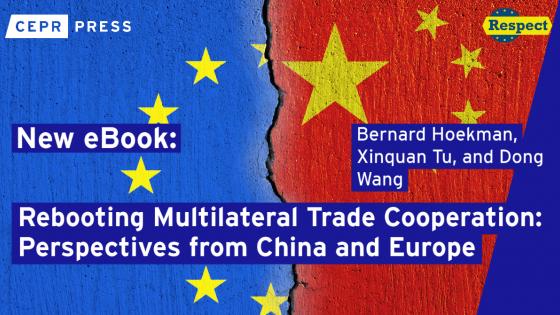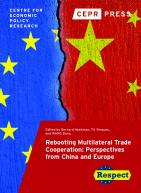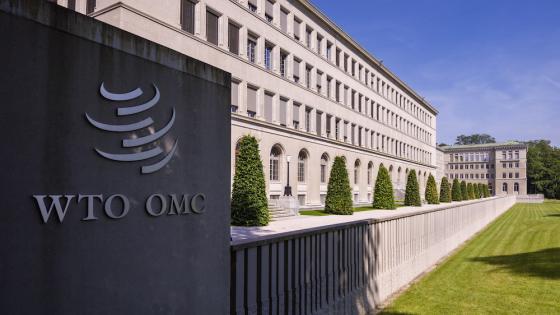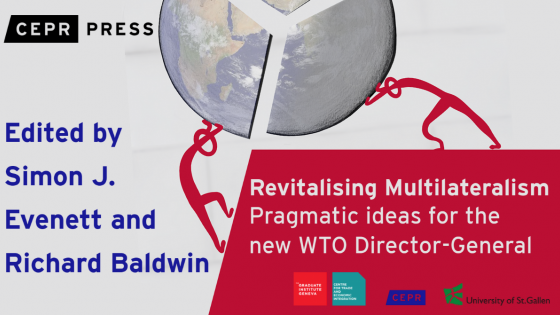An important function of the WTO is to provide a platform for members to negotiate rules of the game that attenuate negative cross-border competitive spillovers generated by trade-related economic policies – and mechanisms to resolve disputes about implementation of negotiated agreements. The WTO has not been fulfilling this function. Many members have prioritised bilateral or regional cooperation. Some – notably the US – have resorted to unilateral action instead of going through the WTO. Those affected can no longer challenge these measures through the WTO dispute settlement process because of parallel US action to shut down the WTO Appellate Body, reflecting US unhappiness with rulings on disputes centring on measures against imports from China and specific features of China’s trade regime. The result is to increase the likelihood of recourse to unilateral measures.
China, the EU, and the US – the three WTO members with the largest global trade shares – play a critical role in keeping the WTO fit for purpose in a rapidly changing world economy. WTO reform is a triangular challenge in the sense that if the three largest trade powers cannot agree, progress is not possible. Tripartite deliberations on address underlying sources of tension and disagreement have been missing. Engagement has instead been bilateral: US–China, EU–China, EU–US.
A new CEPR eBook brings together teams of mostly Chinese and European experts who focus on key challenges confronting the multilateral trading system (Hoekman et al. 2021). An output of a Horizon2020 research project on Realising European Soft Power in Economic Cooperation and Trade (RESPECT), the spirit of the project is captured by a remark quoted in the Introductory essay made by EU Director-General for Trade Sabine Weyand at an event celebrating the 25th anniversary of the WTO to the effect that “the WTO is not the place to drive systems change. It is not about regime change. This is about dealing with the consequences of certain economic systems and to make sure that these are being dealt with in a manner that everyone can live with. And that requires compromise on all sides.”
Download Rebooting Multilateral Trade Cooperation: Perspectives from China and Europe here.
The authors focus on ‘bread and butter’ issues pertaining to the operation of the organization and proposals for moving forward on a plurilateral or multilateral basis. The contributions distinguish between systemic or crosscutting issues and substantive areas of trade-related policy. Five essays address systemic challenges: reviving the WTO negotiation and dispute settlement functions; improving transparency; the treatment of economic development differences; and managing the interface between trade policy and non-trade objectives, including national security. These are complemented by seven essays on substantive policy areas: agriculture, services, e-commerce, investment, subsidies and state-owned or controlled enterprises. All are arguably core topics for the WTO in the sense of affecting most if not all WTO members. Many of the associated policies revolve around the use of tax/subsidies of one form or another.
A premise of many of the analyses is that the willingness of groups of WTO members to negotiate new agreements on specific subjects is conditional on re-establishing an operational dispute settlement system, clarifying how to integrate open plurilateral agreements into the WTO. Doing so is important for WTO members to have incentives to pursue plurilateral agreements, for WTO members that do not wish to engage in plurilaterals to accept that others do so. In parallel, continued efforts to address subjects of long-standing interest to many WTO members, including agriculture and services as well as matters only partially covered by the WTO, such as investment policies, subsidies and state-owned enterprises, are vital to keeping the WTO relevant. Several of the essays addressing ‘new’ issues for the WTO reflect on the recent China-EU Comprehensive Agreement on Investment (CAI), which targets investment policies and includes provisions on subsidies and SOEs. The CAI reveals that agreement on such matters between the major trade powers is possible.
China and the EU have different in views on the relative importance of the cross-border spillovers associated with various types of international trade policy and the potential for joint gains from cooperation. This is neither surprising nor a problem. What matters is that both claim to attach great value to a multilateral trade regime that can serve as an effective platform for negotiating rules for trade-related policies and resolving trade conflicts. The successful conclusion of the bilateral Comprehensive Agreement on Investment between China and the EU at the end of 2020 illustrates cooperation on sensitive policy matters is feasible. China and the EU cannot provide the public good of an open rules-based multilateral trading system on their own, but jointly they carry significant weight in the WTO. Joint action to support the effort needed to address the governance challenges confronting the WTO can help to keep the organization fit for purpose and relevant to its core constituencies.
A willingness to proceed on a plurilateral critical mass basis on issues where waiting for the full membership is not necessary arguably is a key part of revitalising the WTO. Greater reliance on variable geometry to facilitate trade in goods and services and support a shift to a greener, more digital economy is important for the WTO to become more relevant again to the international business community and to permit like-minded countries to cooperate on regulatory matters of common interest. Bolstering the deliberative capacity of the WTO, compiling the data and generating the analysis needed for WTO members to explore the potential contours of new agreements are necessary ingredients. Permitting the WTO Secretariat greater latitude to support the membership through provision of information and encouraging greater participation by stakeholders in WTO deliberations to learn from practice and identify priorities for action to address negative cross-border spillovers would enhance the prospects for cooperation. This does not entail a need for ‘structural’ reform – it simply requires a willingness by the membership to recognise that a ‘member-driven’ organisation does not require unanimity for day-to-day operations and will benefit from full utilisation of the resources of the Secretariat and pro-active engagement with stakeholders.
References
Evenett, S and R Baldwin (eds) (2020), Revitalising Multilateralism: Pragmatic Ideas for the New WTO Director-General, CEPR Press.
Fiorini, M, B Hoekman, P C Mavroidis, D Nelson and R Wolfe (2020), “WTO negotiation and institutional reform priorities: Stakeholder perspectives”, VoxEU.org, 9 July.
Hoekman, B and P C Mavroidis (eds) (2021), “Trade Conflicts, Multilateral Cooperation and WTO Reform”, Global Policy 12(S3).
Hoekman, B and E Zedillo (eds) (2021), Trade in the 21st Century: Back to the Past?, Brookings Institution.
Hoekman, B, X Tu and D Wang (2021), Rebooting Multilateral Trade Cooperation: Perspectives from China and Europe, CEPR Press.
Mavroidis, P C and A Sapir (2021), “China and the WTO: How can they work together better?”, VoxEU.org, 30 April.
Endnotes
1 The project leading to this paper and the volume of essays to which it is an introduction received funding from the European Union’s Horizon 2020 research and innovation program under grant agreement No 770680 (RESPECT).
2 These issues are analysed in Hoekman and Zedillo (2021), which brings together additional papers supported by RESPECT.
3 For analysis and suggestions to manage trade tensions between the three, see Mavroidis and Sapir (2021). Fiorini et al. (2020) report on what the trade community regards as priority areas for action in the WTO.
4 See, for example, the contributions in Evenett and Baldwin (2020) and Hoekman and Mavroidis (2021).



